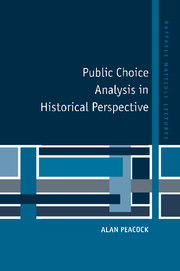Book contents
- Frontmatter
- Contents
- Preface
- PUBLIC CHOICE ANALYSIS IN HISTORICAL PERSPECTIVE
- 1 FIRST LECTURE: The Demand for Historical Perspective
- 2 SECOND LECTURE: Public Choice and the Analysis of Public Sector Growth
- 3 THIRD LECTURE: The Economic Consequences of Public Sector Growth
- 4 FOURTH LECTURE: The Calculus of Consent and Limits on Government Expenditure Growth
- 5 COMMENTARIES
- BIOGRAPHY OF ALAN PEACOCK
- Index
- RAFFAELE MATTIOLI LECTURES
4 - FOURTH LECTURE: The Calculus of Consent and Limits on Government Expenditure Growth
Published online by Cambridge University Press: 04 August 2010
- Frontmatter
- Contents
- Preface
- PUBLIC CHOICE ANALYSIS IN HISTORICAL PERSPECTIVE
- 1 FIRST LECTURE: The Demand for Historical Perspective
- 2 SECOND LECTURE: Public Choice and the Analysis of Public Sector Growth
- 3 THIRD LECTURE: The Economic Consequences of Public Sector Growth
- 4 FOURTH LECTURE: The Calculus of Consent and Limits on Government Expenditure Growth
- 5 COMMENTARIES
- BIOGRAPHY OF ALAN PEACOCK
- Index
- RAFFAELE MATTIOLI LECTURES
Summary
Introduction
In this lecture I propose to illustrate my thesis with reference to the perennial question of how to place limits on the growth of the public sector. In contemporary language employed by public choice theorists we are concerned with the problem of “the taming of Leviathan”.
I shall avoid evaluating normative systems which are commonly used to confer a badge of legitimacy on particular kinds of policy measures or constitutional arrangements employed by Leviathan tamers. I shall however consider the normative origins of such measures or arrangements, if only because these are of particular significance to those public choice theorists concerned about the Leviathan problem. To be more specific, public choice theorists who have placed particular emphasis on allying their normative prescriptions with Paretian type welfare economics derive their policy recommendations from the fulfilment of voters’ choices in which voters have as complete information as possible about the consequences of their decisions. Two major lines of constitutional change are recommended by them. The first is to rid the political system of what may be termed “the tyranny of the median voter” and to maximise the degree of consent to budgetary changes, subject to the constraints imposed by transaction costs. The second is to reduce the prevalence of “fiscal illusion” which enables governments to distort the information available to taxpayers/voters about the consequences of their decisions.
- Type
- Chapter
- Information
- Public Choice Analysis in Historical Perspective , pp. 85 - 114Publisher: Cambridge University PressPrint publication year: 1992



